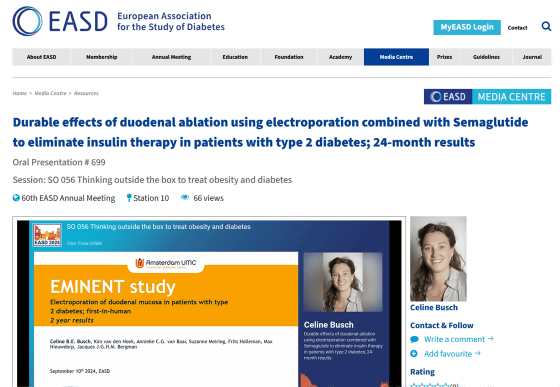Clinical trial of new treatment for type 2 diabetes successfully weaned 86% of patients off insulin

Type 2 diabetes is a disease in which hyperglycemia persists due to a lack of
Durable effects of duodenal ablation using electroporation combined with Semaglutide to eliminate insulin therapy in patients with type 2 diabetes; 24-month results - Media Center | EASD
https://www.easd.org/media-centre/home.html#!resources/b-durable-effects-of-duodenal-ablation-using-electroporation-combined-with-semaglutide-to-eliminate-insulin-therapy-in-patients-with-type-2-diabetes-24-month-results-b

Novel procedure combined with semaglutide may eliminate insulin dependency in type 2 diabetes | UEG - United European Gastroenterology
https://ueg.eu/a/360
Insulin therapy is a treatment in which insulin preparations are injected to control blood sugar levels, and is common in type 1 diabetes patients who have little insulin secretion from the pancreas. Even type 2 diabetes patients who have low insulin secretion or poor response to insulin are treated with insulin therapy.
However, insulin therapy can cause side effects such as weight gain, which can make type 2 diabetes, for which obesity is a significant risk factor, more difficult to manage. Therefore, the development of alternative therapeutic strategies to insulin therapy is needed.

The new treatment announced at
The first clinical trial of the new treatment involved 14 people with type 2 diabetes aged 28 to 75 years, with a body mass index (BMI) in the range of 24 to 40. Participants underwent ReCET under deep sedation, followed by a liquid diet for two weeks, after which they received semaglutide at doses of up to 1mg per week.
Surprisingly, 86% of the subjects (12 of 14) no longer needed insulin at 6 and 12 month follow-up, and this continued at 24 month follow-up. All subjects who were able to wean themselves off insulin maintained glycemic control, with HbA1c levels, which indicate the percentage of hemoglobin bound to sugar, remaining below 7.5%.
The maximum dose of semaglutide was well tolerated in 13 of the 14 patients, although one patient experienced nausea and was unable to receive the maximum dose. All patients completed the ReCET procedure without incident, and no serious side effects were reported.

Study leader Dr Celine Busch from the University Medical Centre Amsterdam said: 'These results are very promising. They suggest that ReCET is a safe and feasible procedure which, in combination with semaglutide, can effectively eliminate the need for insulin therapy.'
Unlike insulin therapy, which requires daily administration, ReCET provides long-term benefits once administered, and importantly, unlike symptomatic drug treatments, ReCET improves the patient's own insulin sensitivity and addresses the underlying cause of type 2 diabetes.
To verify the results of this study, the research team is planning a large-scale randomized controlled trial comparing patients who underwent sham surgery with those who underwent ReCET.
Related Posts:
in Science, , Posted by log1h_ik







